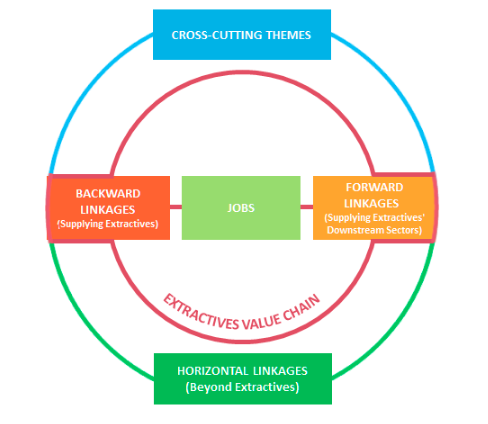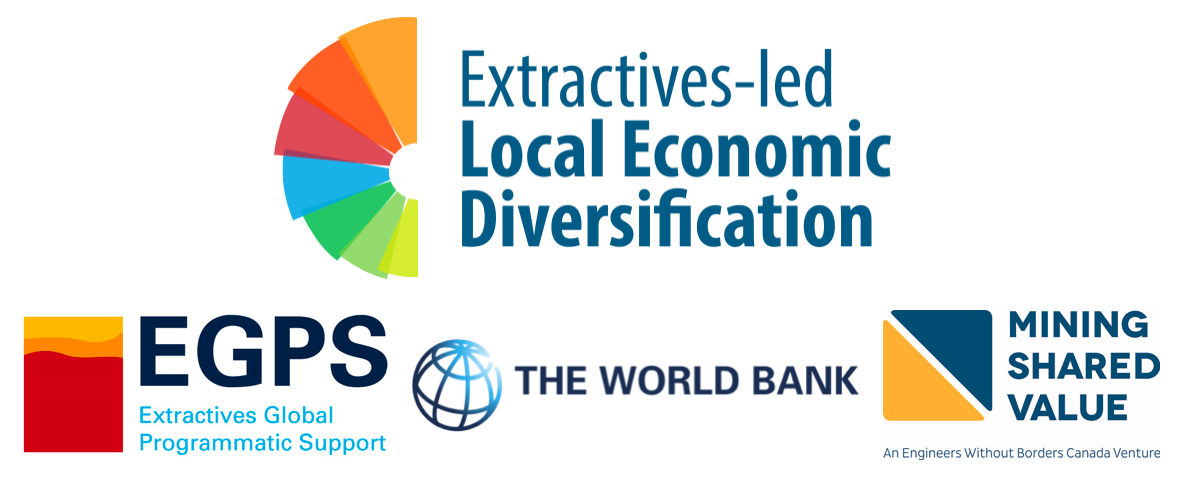- Home
- About ELLED
About ELLED
The ELLED Framework is an online resource that contains guidance and supporting material for the design and implementation of Extractives-led Local Economic Diversification (ELLED) policies and programs.
Aimed primarily at policy makers in resource-rich countries, the ELLED Framework provides structured and intuitive access to the large and diversified body of knowledge, methodologies, and tools with a focus on productive linkages. As such, fiscal and consumption linkages are outside its scope. The ELLED Framework facilitates self-monitoring to allow users to track their learning progress using the Progress Tracker.
The ELLED Framework was developed with the assistance of topical experts around the world. To see the contributors, visit the Contributors page.
The Framework’s structure is illustrated by the following diagram:

Designing ELLED policies that reflect a country’s specific circumstances
It is recognized that country and region has specific features such as culture, history, depth and diversification of its economy, institutional capacity, and political sytems. Often ELLED policies and measures are transplanted from one context to another without due appreciation of the importance of these specific features, which inevitably leads to failure or sub-optimal results. ELLED policies must be designed to meet the specific country contexts, considering the enabling environment, policy objectives, and key stakeholders. To this end, all sections of the ELLED Framework contain material that helps to contextualize the design and implementation of ELLED policies and strategies.
Aligning ELLED policy priorities with private sector interests
There is wide recognition that ELLED approaches can be a critical component of risk mitigation strategies for proposed and existing extractive projects and contribute to social licence to operate. Projects that do not demonstrate a reasonable level of economic and social benefit for host countries and their communities are often exposed to the risk of conflicts, delays, and in extreme cases, project cancellation. In a study on the effects of community level conflict associated with mining projects, the authors estimated that projects with capital expenditure between US$3-5 billion may incur additional costs of roughly US$20 million per week in Net Present Value (NPV) terms associated with delayed product (Davis and Franks 2014, p. 8).
To increase industry buy-in for ELLED policies it is important to establish a dialogue between policy makers and industry at early stages of policy design. ELLED strategies that align with core business activities and make financial sense over the long-term are usually more easily supported by the private sector.
On the other hand, top down approaches with little or no industry consultation often result in sub-optimal impact because of excessively ambitious targets which do not adequately reflect local circumstances or industry investment plans, and failure to secure industry buy-in. Designing ELLED policies with all key stakeholders participating from the outset is therefore a key strategy to increase successful outcomes.
The ELLED Community of Practice
The Framework is complemented by an online community of practice called the ELLED CoP, designed to facilitate access to and interaction among policy makers, industry experts, practitioners, and donors on matters related to local content and local value creation in mineral and petroleum rich countries. The ELLED Community of Practice is an invitation-only online platform and functions as a complementary space for practitioners to contribute to ongoing discussions, share ideas, relevant news, and knowledge. The CoP is described here in greater detail.
Do you work in ELLED-related topics in mining, oil and gas? Request to join the ELLED CoP.
The Extractives-Led Local Economic Diversification (ELLED) Program
The ELLED Framework and the ELLED Community of Practice are part of a broader program, the Extractives-Led Local Economic Diversification (ELLED) program. Managed by the Energy and Extractives Global Practice of the World Bank with financial support from the Extractives Global Programmatic Support (EGPS), it supports cuttingedge research and the systematization and sharing of existing knowledge to address extractives-related policy challenges, including local content policies, climate smart investment, strategic spatial planning, forward looking value chains, and the development of network economies.
Both the ELLED Framework and the ELLED CoP were developed in association with the Mining Shared Value (MSV) initiative of Engineers Without Borders Canada, which owns and manages the ELLED Framework website.

Any information or quantitative output derived from information contained in this website is for information purposes and should not be relied upon as financial, legal, business or any other advice or recommendation.
